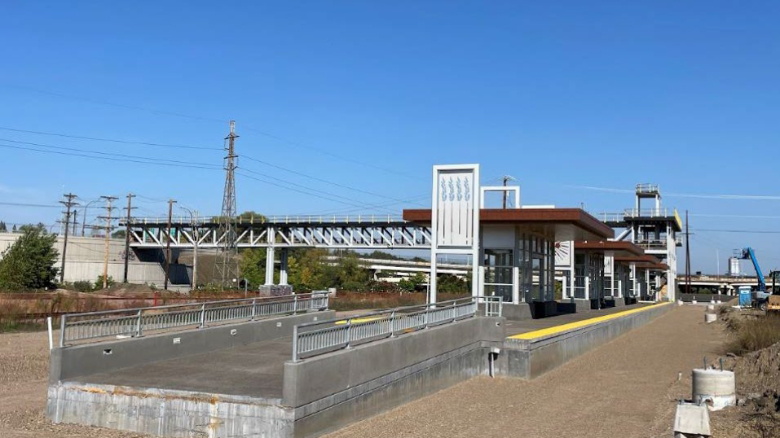Employee Sues Agency Behind Delayed Minnesota Light Rail Project | Columbus Ohio Dump Trucks
Legal

Work is essentially complete at 11 of the 16 stations planned as part of the Metro Green Line Extension.
Photo courtesy of Metropolitan Council Transportation Committee
A Metropolitan Council employee alleges in a lawsuit that officials with the Minneapolis-area agency subverted project controls on the Metro Green Line Extension light rail project, allowing the schedule to slip years beyond the initial deadline and costs to balloon by over $85 million.
Michael Janish is a licensed engineer who was a project controls manager on the extension, which was previously known as the Southwest Light Rail Transit project, from 2015 until he was reassigned in 2022. In his suit, he accuses the Met Council and one of his bosses of retaliating against him for raising issues about problems with the project. Officials say the project’s cost has risen from $2 billion to $2.86 billion and its completion date was delayed from 2023 to 2027.
The project is for a 14.5-mile light rail route extension that will add 16 stations in Minneapolis and four suburban communities.
The Met Council issued 658 change orders for the project through October 2022, according to a state auditor’s report from last year. In his complaint, Janish alleges Met Council leaders subverted project controls when negotiating change orders with the contractor, Lunda/C.S. McCrossan Joint Venture, in order to “keep the government’s money flowing.”
In an answer to the complaint, Met Council says the project has required so many change orders because of unforeseen site conditions and flaws in the project’s initial design. Janish’s objections to the process “reflected a fundamental misunderstanding of applicable law and industry practice,” attorneys representing the agency wrote.
AECOM Technical Services was consulting for Met Council, providing it with cost estimates for the various change orders. But Janish says in the complaint that the contractor’s cost estimates “routinely dwarfed” estimates prepared by AECOM. He alleges that officials began accessing the contractor’s proposals before seeing independent estimates from AECOM, and then let employees charged with overseeing the change order process provide them to the contractor.
Neither Lunda/C.S. McCrossan JV nor AECOM are part of the lawsuit. A representative for the joint venture declined to comment, and AECOM did not immediately respond to inquiries.
A 2021 Minnesota Office of the Legislative Auditor report highlighted concerns about the process that had been raised with Met Council staff by an AECOM executive. Janish’s complaint raises allegations similar to some of the concerns, and goes into detail about how he claims the Met Council improperly changed cost estimates.
According to Janish, Met Council leadership used formulas in an Excel workbook to add “arbitrary markups” to change order cost estimates. His complaint highlights an example of two change orders related to the extension of a crash protection barrier between the Glenwood Avenue bridge and Bryn Mawr station. AECOM estimated the cost at $23 million. After Met Council ran that estimate in the Excel file, Janish alleges the manipulated cost estimate rose to $35 million. But the contractor estimated the cost at close to $100 million, and Met Council went back to AECOM asking it to increase its estimate. The consultant refused, and Met Council still ultimately agreed to pay about $92.5 million for the columbus oh dump truck work associated with the two change orders.
Met Council says in its response to the suit that the negotiated costs for change orders highlighted in the complaint were fair, and the Excel workbook was used appropriately to correct estimates that omitted or failed to consider relevant factors such as site constraints.
Janish alleges in his suit that Met Council leaders began “laying the groundwork for his ouster as a ‘poor-performing’ employee” as retaliation after he refused to approve “unlawful” change orders. They then removed him from the Green Line project, and reassigned him to another light rail project.
In its response, Met Council wrote that the reassignment was a “lateral transfer” with just as much opportunity for future growth and no decrease in compensation.
“The Metropolitan Council believes the allegations are wholly without merit and will vigorously defend this lawsuit,” Met Council representative Terri Dresen said in a statement.
Meanwhile, columbus oh dump truck work is continuing on the project. Last August, the Met Council and Hennepin County reached an agreement resolving a funding gap. And last month at a Met Council Transportation Committee meeting, Jim Alexander, the project director, said construction of 11 stations was essentially complete, other than some punch list items. About 10 miles of track had been laid and structural columbus oh dump truck work for the 11 bridges involved in the project also was essentially done, he added.
“We had a pretty good year in 2023 with construction … but we still have a lot to do,” Alexander said.

